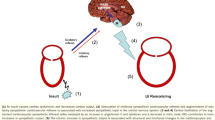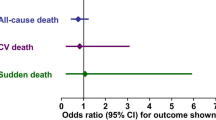Abstract
Chronic heart failure (CHF) is a common and disabling condition with an incidence and prevalence that increase sharply with age. The median age of presentation of new heart failure cases is >75 years. Effective treatments, including β-adrenoceptor antagonists, have been proven in randomised, controlled trials. The average age in these placebo-controlled mortality and morbidity studies of β-adrenoceptor antagonists in heart failure has, however, been <63 years, and all patients with an ejection fraction ≥40% were excluded. This lack of a representative sample of elderly patients with heart failure has raised concerns about extrapolating the available evidence for β-adrenoceptor antagonists to a more elderly heart failure population. β-Adrenoceptor antagonists may have a less beneficial effect or even an adverse effect in elderly heart failure patients. There is evidence that β-adrenoceptor antagonists are less frequently prescribed in elderly CHF patients, and that this lack of treatment is associated with impaired outcomes. Establishing which β-adrenoceptor antagonists, if any, are effective in elderly CHF is therefore of extreme importance. The elderly have a reduced cardiovascular reserve and may be less tolerant of the introduction of a vasocon-stricting β-adrenoceptor antagonist. In addition, the higher proportion of elderly CHF patients with relatively preserved systolic function (for which no treatment has been proven to reduce mortality and morbidity) means that we cannot say with certainty that β-adrenoceptor antagonists have been proven to be effective in a general elderly CHF population. Third-generation β-adrenoceptor antagonists with vasodilating actions in addition to their β-adrenoceptor antagonist effects may offer several theoretical advantages over earlier β-adrenoceptor antagonists for elderly CHF patients. Three of this class (carvedilol, bucindolol and nebivolol) have been evaluated with respect to their efficacy in reducing mortality and morbidity in CHF, and only two of these (carvedilol and nebivolol) had a proven outcome benefit in a properly powered randomised, controlled trial. Only the Study of the Effects of Nebivolol Intervention on Outcomes and Rehospitalisation in Seniors with Heart Failure (which used the vasodilating third-generation β-adrenoceptor antagonist nebivolol) has prospectively investigated the treatment of CHF in elderly patients, including those with preserved systolic function, and demonstrated a significant reduction in the risk of death or cardiovascular hospitalisation. In conclusion, prescribers are advised that nebivolol should be preferred in elderly patients with CHF, because of its proven efficacy in a representative group of elderly CHF patients.

Similar content being viewed by others
References
Task Force for the Diagnosis and Treatment of Chronic Heart Failure. European Society of Cardiology. Eur Heart J 2001; 22: 1527–60
Cowie MR, Fox KF, Wood DAC, et al. Hospitalization of patients with heart failure: a population-based study. Eur Heart J 2002; 23: 877–85
Hall SA, Cigarroa CG, Marcoux L, et al. Time course of improvement in left ventricular function, mass and geometry in patients with congestive heart failure treated with beta adrenergic blockade. J Am Coll Cardiol 1995; 25: 1154–61
Rousseau MF, Chapelle F, Van Eyll C, et al. Medium-term effects of beta-blockade on left ventricular mechanics: a double-blind, placebo-controlled comparison of nebivolol and atenolol in patients with ischemic left ventricular dysfunction. J Card Fail 1996; 2(1): 15–23
The Cardiac Insufficiency Bisoprolol Study II (CIBIS II): a randomised trial. Lancet 1999; 353: 9–13
Effects of controlled-release metoprolol on total mortality hospitalizations, and well-being in patients with heart failure: the Metoprolol CR/XL Randomized Intervention Trial in congestive heart failure (MERIT-HF). MERIT-HF Study Group. JAMA 2000; 283: 1295–302
Shibata MC, Flather MD, Wang D. Systematic review of the impact of beta blockers on mortality and hospital admissions in heart failure. Eur J Heart Fail 2001; 3: 351–7
Cowie MR, Wood DA, Coats AJ, et al. Incidence and aetiology of heart failure; a population-based study. Eur Heart J 1999; 20(6): 421–8
Ebstein RP, Stessman J, Eliakim R, et al. The effect of age on beta-adrenergic function in man: a review. Isr J Med Sci 1985; 21(3): 302–11
Packer M, Coats AJ, Fowler MB, et al., Carvedilol Prospective Randomized Cumulative Survival Study Group. Effect of carvedilol on survival in severe chronic heart failure. N Engl J Med 2001; 344: 1651–8
The Xamoterol in Severe Heart Failure Study Group. Xamoterol in severe heart failure [published erratum appears in Lancet 1990; 336: 698]. Lancet 1990; 336: 1–6
Maack C, Bohm M, Vlaskin L, et al. Partial agonist activity of bucindolol is dependent on the activation state of the human β1-adrenergic receptor. Circulation 2003; 108: 348–53
Deedwania PC, Gottlieb S, Ghali JK, et al., MERIT-HF Study Group. Efficacy, safety and tolerability of beta-adrenergic blockade with metoprolol CR/XL in elderly patients with heart failure [published erratum appears in Eur Heart J 2004; 25: 1968]. Eur Heart J 2004; 25: 1300–9
Cujec B, Quan H, Jin Y, et al. The effect of age upon care and outcomes in patients hospitalized for congestive heart failure in Alberta, Canada. Can J Aging 2004; 23: 255–67
Komajda M, Lapuerta P, Hermans N, et al. Adherence to guidelines is a predictor of outcome in chronic heart failure: the MAHLER survey. Eur Heart J 2005; 26: 1653–9
Cockcroft J. Nebivolol: a review. Expert Opin Pharmacother 2004; 5(4): 893–9
Packer M, Bristow MR, Cohn JN, et al. The effect of carvedilol on morbidity and mortality in patients with chronic heart failure. US Carvedilol Heart Failure Study Group. N Engl J Med 1996; 334: 1349–55
Poole-Wilson PA, Swedberg K, Cleland JG, et al., Carvedilol or Metoprolol European Trial Investigators. Comparison of carvedilol and metoprolol on clinical outcomes in patients with chronic heart failure in the Carvedilol Or Metoprolol European Trial (COMET): randomised controlled trial. Lancet 2003; 362: 7–13
Packer M, Fowler MB, Roecker EB, et al., Carvedilol Prospective Randomized Cumulative Survival (COPERNICUS) Study Group. Effect of carvedilol on the morbidity of patients with severe chronic heart failure: results of the carvedilol prospective randomized cumulative survival (COPERNICUS) study. Circulation 2002; 106: 2194–9
Watts SW, Fink GD, Silver PJ, et al. Interaction of the beta adrenergic receptor antagonist bucindolol with serotonergic receptors. J Cardiovasc Pharmacol 2000; 35: 29–36
Beta-Blocker Evaluation of Survival Trial Investigators. A trial of the beta-blocker bucindolol in patients with advanced chronic heart failure. New Engl J Med 2001; 344: 1659–67
Kalinowski L, Dobrucki LW, Szczepanska-Konkel M, et al. Third-generation beta-blockers stimulate nitric oxide release from endothelial cells through ATP efflux: a novel mechanism for antihypertensive action. Circulation 2003; 107: 2747–52
Shibata MC, Flather MD, Böhm M, et al. Study of the Effects of Nebivolol Intervention on Outcomes and Rehospitalisations in Seniors with Heart Failure (SENIORS): rationale and design. Int J Cardiol 2002; 86: 77–85
Flather MD, Shibata MC, Coats AJ, et al., SENIORS Investigators. Randomized trial to determine the effect of nebivolol on mortality and cardiovascular hospital admission in elderly patients with heart failure (SENIORS). Eur Heart J 2005; 26: 215–25
Acknowledgements
Professor Coats has been supported by the British Heart Foundation, the Viscount Royston Cardiomyopathy Trust and the University of Sydney. He has also received research grants and consultancy fees for expert advice from Roche, Astra-Zeneca and Menarini.
Author information
Authors and Affiliations
Corresponding author
Rights and permissions
About this article
Cite this article
Coats, A.J.S. β-Adrenoceptor Antagonists in Elderly Patients with Chronic Heart Failure. Drugs Aging 23, 93–99 (2006). https://doi.org/10.2165/00002512-200623020-00001
Published:
Issue Date:
DOI: https://doi.org/10.2165/00002512-200623020-00001




